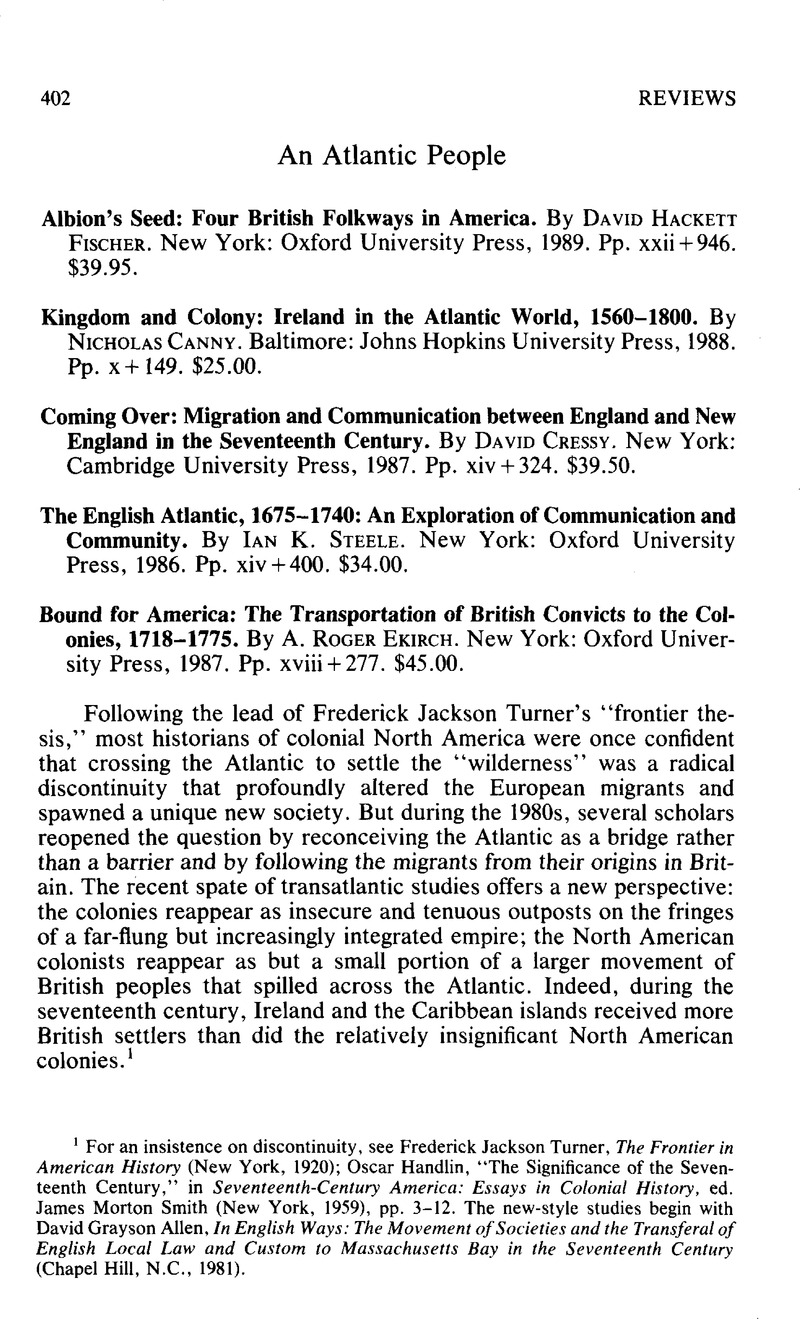No CrossRef data available.
Article contents
An Atlantic People - Albion's Seed: Four British Folkways in America. By David Hackett Fischer. New York: Oxford University Press, 1989. Pp. xxii + 946. $39.95. - Kingdom and Colony: Ireland in the Atlantic World, 1560–1800. By Nicholas Canny. Baltimore: Johns Hopkins University Press, 1988. Pp. x + 149. $25.00. - Coming Over: Migration and Communication between England and New England in the Seventeenth Century. By David Cressy. New York: Cambridge University Press, 1987. Pp. xiv + 324. $39.50. - The English Atlantic, 1675–1740: An Exploration of Communication and Community. By Ian K. Steele. New York: Oxford University Press, 1986. Pp. xiv + 400. $34.00. - Bound for America: The Transportation of British Convicts to the Colonies, 1718–1775. By A. Roger Ekirch. New York: Oxford University Press, 1987. Pp. xviii + 277. $45.00.
Published online by Cambridge University Press: 10 January 2014
Abstract

- Type
- Reviews
- Information
- Copyright
- Copyright © North American Conference of British Studies 1990
References
1 For an insistence on discontinuity, see Turner, Frederick Jackson, The Frontier in American History (New York, 1920)Google Scholar; Handlin, Oscar, “The Significance of the Seventeenth Century,” in Seventeenth-Century America: Essays in Colonial History, ed. Smith, James Morton (New York, 1959), pp. 3–12Google Scholar. The new-style studies begin with Allen, David Grayson, In English Ways: The Movement of Societies and the Transferal of English Local Law and Custom to Massachusetts Bay in the Seventeenth Century (Chapel Hill, N.C., 1981)Google Scholar.
2 Bailyn, Bernard, Voyagers to the West: A Passage in the Peopling of America on the Eve of the Revolution (New York, 1986), p. 4Google Scholar.
3 Governor Berkeley was less sure about his own power and the unity of his colonists; he despaired of ever controlling “a People wher six parts of seaven at least are Poore Endebted Discontented and Armed” (quoted in Ekirch, , Bound for America, p. 134Google Scholar).
4 Axtell, James, “The Ethnohistory of Early America: A Review Essay,” William and Mary Quarterly, 3d ser., 35 (1978): 110–44CrossRefGoogle Scholar; Breen, T. H., “Creative Adaptations: Peoples and Cultures,” in Colonial British America: Essays in the New History of the Early Modern Era, ed. Greene, Jack P. and Pole, J. R. (Baltimore, 1984), pp. 195–232Google Scholar; Merrell, James H., “Some Thoughts on Colonial Historians and American Indians,” William and Mary Quarterly, 3d ser., 46 (1989): 94–119CrossRefGoogle Scholar; Nash, Gary B., “Social Development,” in Colonial British America, in Greene, and Pole, , eds., pp. 233–61Google Scholar; Sobel, Mechal, The World They Made Together: Black and White Values in Eighteenth-Century Virginia (Princeton, N.J., 1987)Google Scholar.




